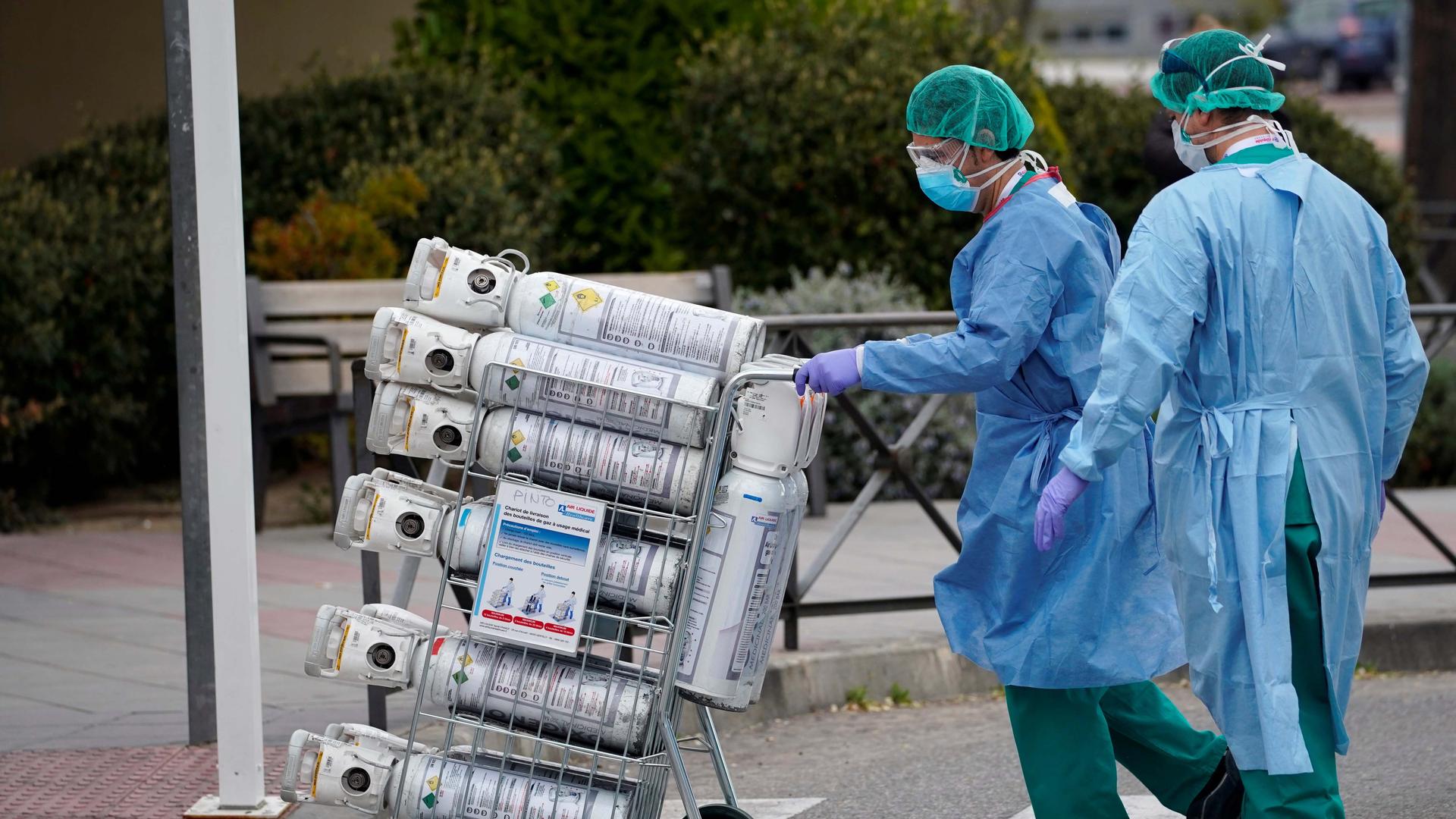Health care workers wearing protective face masks bring oxygen bottles to the emergency unit at 12 de Octubre Hospital amid the coronavirus disease (COVID-19) outbreak in Madrid, March 30, 2020.
It’s going to get worse before it gets better. That is the message from Dr. Deborah Birx, the response coordinator for the White House’s coronavirus task force, who gave her predictions on Monday of what could happen in the coming months.
“If we do things together, well, almost perfectly, we could get in the range of 100,000 to 200,000 fatalities,” she said on NBC’s “Today” show.
That’s a best-case scenario if the US does things right.
With medical equipment in short supply, hospitals in Italy have already had to ration care. And now doctors in New York are planning how to treat patients in overcapacity intensive care units with limited equipment.
Related: COVID-19: The latest from The World
This issue of how to ration scarce medical resources is the subject of an article in The New England Journal of Medicine. Dr. Ezekiel Emanuel, one of the authors, was a health policy adviser to former President Barack Obama and teaches medical ethics at the University of Pennsylvania. He spoke to The World’s host Marco Werman about the difficult decisions US health care workers must make as they care for a flood of coronavirus patients.
Marco Werman: So, shortages of masks, tests and potentially even beds and ventilators. What are some of the pressures that came to bear in a place like Italy with rationing? And what were some of the choices that had to be made there?
Dr. Ezekiel Emanuel: Well, they had exactly the choices you were talking about. They had not enough ICU beds for all the patients who needed it. They did not have enough ventilators in certain places. You know, doctors are having to choose which patients get on and which patients don’t.
Related: ‘We are seeing many doctors falling ill’ with coronavirus, Italian doctor says
So, to put this in plain English, it might mean a doctor would have to choose between an elderly patient who doesn’t have that many more years to live and a younger patient, correct?
Well, you may have to choose between two older patients or two younger patients. Depends how bad the shortages are and which patients you’re being confronted with at your facility. These are all tragic choices. There are no good, simple options. It’s not like you can put your head in the sand and say, “Oh, this shortage is going to pass.” Part of the issue is that the shortage won’t pass. And you are forced by nature — not because you want to, but by nature — to make a choice.
And this is one of the most serious, wrenching, taxing choices that doctors and nurses have to make. And, you know, you’ve seen reports of people actually crumbling under the pressure because no one wants to make it. You go into the medical profession to heal, to care for people. And this is one where you can’t care for someone. You feel powerless. And people are worried about burnout and PTSD because of these kinds of choices. It’s really, really tragic.
Related: Hong Kong epidemiologist warns pandemic’s end won’t be straightforward
And in your article in The New England Journal of Medicine, you and your co-authors outline fundamental values that might apply to making these gut-wrenching choices. What are they?
Well, quickly — you want to maximize the benefit. That’s the most important thing, both in terms of life saved and in terms of life years or prognosis. You want to, you know, realize equality when you have patients that are roughly equal in prognosis. You want to actually do some random selection. You want to recognize social usefulness, doctors, nurses, other front-line first responders. They have to get priority to continue doing their job. And you want to give priority to the worst off.
In this case, the worst off are the youngest who will die without having an opportunity to live a full life. I ought to say one other thing. These priority decisions are not just for COVID-19 patients. They have to apply for all patients. If you happen to have a heart attack or a stroke or cancer, you should get priority justice equal to a COVID-19 patients. So, really, all patients who need health care resources have to be considered at the same time. And that makes these choices even more complicated than just choosing between one COVID-19 patient and another COVID-19 patient.
This interview has been condensed and edited for clarity.
Our coverage reaches millions each week, but only a small fraction of listeners contribute to sustain our program. We still need 224 more people to donate $100 or $10/monthly to unlock our $67,000 match. Will you help us get there today?
